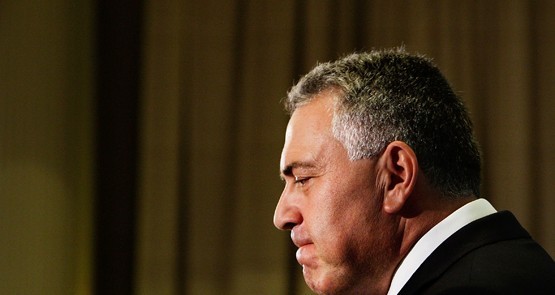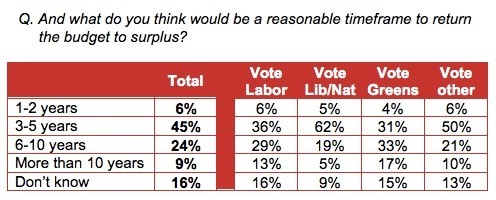Voters see returning to surplus as important, and acknowledge it will take time, but most aren’t confident the government has a plan for achieving it, according to this week’s Essential Research poll.
Around 70% of voters say returning to surplus is important — 31% say it is “very important” and another 40% say it is somewhat important. Just 6% of voters say it is not at all important, and 14% rate it not very important — with 43% of Greens voters saying it isn’t important compared to 20% of all voters.
Only 6% say there should be an immediate return to surplus, but 45% of voters say we should return to surplus over the next three to five years, compared to 24% who say six to 10 years and 9% who are relaxed about the return to surplus taking more than a decade.
Voters are consistent in not favouring an immediate return to surplus, but Liberal voters are far more strongly (62%) in favour of a near-term return over three to five years, compared to Labor voters (36%) and Greens voters (31%), while 50% of Greens voters say six or more years.
But when asked how confident they are that the government has “an effective plan to eliminate the budget deficit”, 52% say they are not at all or not very confident compared to 36% who say they are “very” or “somewhat” confident.
The result runs strongly on partisan lines, with 71% of Labor voters (and 75% of Greens voters) saying they aren’t confident and 71% of Coalition voters saying they are very or somewhat confident.
There’s better news for the Coalition, however, with a strong endorsement of its decision to halt family payments to parents who fail to vaccinate their children without a medical exemption.
Seventy-seven per cent of voters back the decision, with support strongest among Liberal voters (90%) and over-55s (81%), with no differences between men and women. The only faint trace of anti-vax sentiment can be found among Other voters, who split 69%-25%, including 17% who “strongly disapprove” of the decision.
Voters also back possible changes to Senate voting to exclude micro-parties, despite viewing small parties as good for democracy. Forty per cent of voters back “changes that would make it harder for small parties to be elected to Senate” compared to 33% who disapprove.
But partisanship plays an important role: Coalition voters approve such changes overwhelmingly, 62%-21%; Labor voters split evenly 35%-34%; and Greens voters disapprove 49%-28% despite the Greens backing such changes. “Other” voters, unsurprisingly, strongly disapprove of such changes, 72%-19%, and have a much lower “don’t know” response.
Forty-two per cent of voters agree that “having small parties in the Senate is good for democracy”, while 35% believe “having small parties in the Senate makes government too unstable”, with Coalition voters much more likely to back the second view.
That partisan split echoes a result in July last year, when non-Coalition voters thought having the Senate balance of power rest with microparties was good for democracy while Coalition voters thought it would be bad for democracy.
On voting intention, the Coalition is down a point to 40% and Labor remains on 40% and the Greens are down a point to 9%, for a small shift in the 2PP outcome to 53%-47% in Labor’s favour.










We’re waking up to Grimm’s fairy tales?
They have two budgets to show their worth. They cocked up the first & the second will be pre-election sweetener. So, let’s wait and see how this comedy unfolds ….
Crikey on principle has little faith in the Coalition or, for that matter, any individual or entity which doesn’t adhere to Crikey’s Party Line.